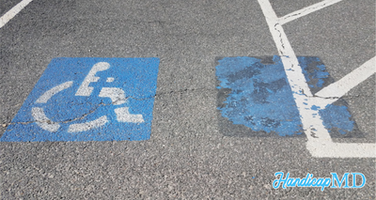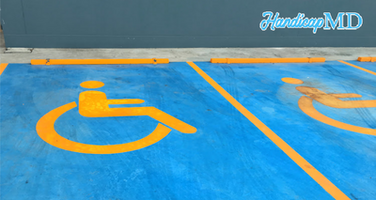
Disabled Parking Permit in Fayetteville, AR: How to Obtain and Use a Handicap Parking Permit
Accessibility is essential for creating an inclusive society, and disability tags play a crucial role in enhancing mobility for individuals with disabilities. If you live in Fayetteville, AR, understanding how to obtain and use a disability tag is vital. This article provides an in-depth guide on eligibility, the application process, benefits, and the proper use of disability tags in the city.
What is a Disabled Parking Permit?
A disability tag is a placard or license plate issued to individuals with qualifying disabilities. These tags allow the use of reserved accessible spaces, typically located close to building entrances and equipped with features like extra space for mobility aids.
Disability tags are administered by the state Department of Finance and Administration (DFA) and serve as a visible symbol that an individual or vehicle has permission to use these designated areas.
The Importance of Disabled Permits and Their Role in Enhancing Accessibility
Disability tags are more than a convenience—they are a lifeline to independence. They play a vital role in fostering inclusivity and accessibility in the city and beyond.
Key Roles of Disability Tags:
- Enhancing Mobility: Reserved spaces reduce physical strain and offer safe access to essential locations.
- Supporting Independence: Disability tags empower individuals to navigate their communities without undue hardship.
- Promoting Social Inclusion: These tags help ensure equitable participation in work, education, and social activities.
By addressing mobility challenges, disability tags contribute to a more equitable society where everyone can thrive.
The Benefits of Obtaining a Disabled Permit in Fayetteville
City residents who qualify for a handicap permit can enjoy several benefits:
- Priority Spaces: Access to designated spaces at public venues, shopping centers, and healthcare facilities.
- Ease of Travel: Reduced walking distances from parking areas to building entrances.
- Legal Protections: Avoidance of fines or penalties for using accessible spaces.
- Recognition Across States: Arkansas handicap placards are recognized nationwide, making them useful for interstate travel.
Eligibility Criteria
To obtain a disability tag in Fayetteville, applicants must meet specific eligibility criteria established by the state DFA. Certification by a licensed healthcare provider is required to confirm the applicant’s qualifying condition.
Common Eligibility Requirements:
- Mobility Impairments: Individuals who cannot walk 200 feet without stopping to rest or rely on assistive devices like wheelchairs or walkers.
- Respiratory Issues: Conditions requiring the use of portable oxygen or resulting in restricted lung function.
- Cardiac Conditions: Heart disease classified as Class III or IV by the American Heart Association.
- Visual Impairments: Legal blindness or significant vision loss.
A completed application form, medical certification, and identification are typically required to apply.
Common Medical Conditions and Examples
Many medical conditions qualify an individual for a disability tag. These include, but are not limited to:
- Chronic Pain or Arthritis: Conditions like rheumatoid arthritis or osteoarthritis that severely limit mobility.
- Neurological Disorders: Multiple sclerosis, Parkinson’s disease, or cerebral palsy.
- Post-Surgical Recovery: Temporary disabilities following surgeries, such as joint replacements.
- Amputation or Limb Loss: Partial or total loss of a limb affecting mobility.
Each condition reflects the diverse needs disability tags address, ensuring equitable access for all.
Different Types of Handicap Permits Available in Fayetteville
The state DFA offers several types of disability tags to accommodate different needs and circumstances:
Permanent Tags:
- Issued to individuals with long-term or permanent disabilities.
- Valid for four years and renewable upon expiration.
Temporary Tags:
- Designed for short-term conditions, such as recovery from surgery or injury.
- Typically valid for up to six months.
Disability License Plates:
- Assigned to vehicles owned by individuals with disabilities.
- Provides the same benefits as tags but is affixed to the vehicle.
Disabled Veteran Plates:
- Available to veterans with service-connected disabilities.
- Often exempt from certain fees and provide recognition for military service.
Step-by-Step Application Process for a Disabled Parking Permit in Fayetteville
Applying for a handicap placard in Fayetteville is a straightforward process. The state Department of Finance and Administration (DFA) provides clear guidelines to help eligible residents secure their tags.
Steps to Apply:
- Download the Application for Persons with a Disability License Plate or Placard (Form 10-336) from the state DFA website or visit your local revenue office to pick up a copy.
Complete Personal Information:
- Fill out the required sections, including your name, address, and vehicle information (if applying for a disability plate).
- Have the form completed and certified by a licensed healthcare provider. This step confirms your qualifying disability.
Submit the Application:
- Take the completed form, along with a valid photo ID, to your local revenue office. If applying by mail, include a copy of your ID and any applicable fees.
Receive Your Disability Tag:
- Once your application is processed, you’ll receive your tag or license plate. For temporary tags, ensure your medical provider has indicated the duration of need on the form.
Benefits of Using HandicapMD.com for Online Applications
HandicapMD.com is a trusted resource designed to take the hassle out of applying for disability tags. Here are the key benefits of using this platform:
- Convenience: With HandicapMD.com, you can complete the entire process from the comfort of your home, avoiding the need for in-person visits to government offices.
- Time-Saving: The platform eliminates long wait times by allowing users to submit their application, upload documents, and check statuses online.
- Error Reduction: The system provides step-by-step instructions, ensuring applicants avoid common errors that can lead to delays or rejections.
- Comprehensive Support: If you encounter issues, HandicapMD.com offers responsive customer service to guide you through the process.
- Accessibility: Designed with user-friendly features, the platform is intuitive and inclusive, making it easier for individuals of all tech proficiency levels.
By leveraging HandicapMD.com, city residents gain access to a modern, efficient solution tailored to their needs.
Walkthrough of the HandicapMD.com Application Process
Applying for disability tags through HandicapMD.com is straightforward. Follow these simple steps to complete your application:
Create an Account: Start by registering on the website with basic personal information. This ensures your details are securely stored and accessible for future reference.
Upload Necessary Documentation: Gather the required documents, such as proof of disability from a licensed medical provider and identification. The platform allows you to upload scanned copies directly.
Complete the Online Form: Fill out the online application with details about your disability and vehicle. The form includes easy-to-understand prompts and dropdown menus to simplify the process.
Submit for Review: Once you’ve completed the form and uploaded all documents, submit your application. HandicapMD.com will review your submission for accuracy and compliance.
Track Your Application: After submission, you can log into your account to track the status of your application. Notifications will alert you to any required updates or when your tag is approved.
Receive Your Tags: Upon approval, your disability tags will be processed and sent to you, completing the process without any need for in-person visits.
Why Applying Online is the Best Option
Applying online through HandicapMD.com offers several advantages compared to traditional methods:
- Eliminates In-Person Barriers: Avoiding trips to government offices is especially valuable for those with mobility challenges or demanding schedules.
- Reduces Stress: The online process minimizes paperwork and streamlines communication, making it less overwhelming.
- Speeds Up Approval Times: Digital applications are typically processed faster than physical ones, allowing you to receive your disability tags sooner.
- Eco-Friendly: Online applications reduce the need for printed forms, contributing to environmental sustainability.
- Available 24/7: You can work on your application at any time that suits your schedule, offering unparalleled flexibility.
City residents embracing this online solution means a faster, more accessible way to secure disability tags, ultimately improving mobility and quality of life.
Fees
Fees are minimal, making them accessible to eligible residents.
- Permanent Tags: Issued free of charge.
- Temporary Tags: A small fee, usually $1, may apply.
- Disability License Plates:
- Standard vehicle registration fees apply, though additional fees may be waived for individuals with qualifying conditions.
- Disabled Veteran Plates: Often exempt from standard registration fees, though documentation of a service-connected disability is required.
For the most accurate fee information, check with your local revenue office or the state DFA.
Validity and Expiration
Disability tags have varying validity periods depending on their type:
- Permanent Tags: Valid for four years and must be renewed upon expiration.
- Temporary Tags: Valid for up to six months, depending on the duration certified by a healthcare provider.
- Disability License Plates: Valid for the vehicle’s annual registration period and require renewal each year.
Placard holders should monitor expiration dates to ensure uninterrupted access to accessible spaces.
Renewal Process
The renewal is a simple process that ensures continued access to designated spaces:
Check Expiration Dates:
- For tags, locate the expiration date printed on the tag. For license plates, refer to your vehicle’s registration renewal notice.
Complete a Renewal Application:
- Obtain a new Form 10-336 if recertification is required or contact your local revenue office for renewal options.
Medical Recertification:
- Permanent tags typically do not require new medical certification unless requested. Temporary tags will require updated documentation.
Submit the Renewal:
- Bring your renewal application and any necessary fees to your local revenue office.
Receive Your Renewed Tag:
- Once processed, you’ll receive your updated tag or license plate.
Replacing Lost, Stolen, or Damaged Handicap Permits in Fayetteville
If your disability tag is lost, stolen, or damaged, you can request a replacement by following these steps:
Report the Incident (if applicable):
- For stolen tags, file a report with local law enforcement to document the theft.
Obtain a Replacement Application:
- Download a new Form 10-336 from the Arkansas DFA website or visit your local revenue office.
Complete the Form:
- Indicate that you are requesting a replacement and provide all necessary personal and vehicle details.
Submit Supporting Documents:
- Include proof of identity and, if applicable, a copy of the police report.
Pay the Replacement Fee:
- A small fee, typically $1, may be required for a replacement tag or plate.
Receive Your Replacement:
- Once your application is processed, you’ll receive a new tag or license plate.
How to Display Your Handicap Permit Correctly
Displaying your handicap placard correctly is essential to ensure compliance with regulations and maintain access to designated spaces. Proper display also prevents fines or penalties and ensures that your tag is easily recognized by local enforcement officials.
Guidelines for Proper Display:
Placards:
- Hang the tag from the rearview mirror when your vehicle is parked in an accessible space.
- Ensure the printed side, showing the disability symbol and expiration date, is visible from outside the vehicle.
- Remove the tag while driving to avoid obstructing your view.
License Plates:
- Attach the disability license plate securely to the rear of your vehicle (and the front if the state law requires).
- Keep your vehicle registration in the car to provide proof of eligibility if needed.
Improper display, such as placing the tag on the dashboard or failing to secure a license plate, can lead to confusion, fines, or denied access to accessible spaces.
Using Your Fayetteville Disabled Permit in Other States
One of the benefits of a disability tag is its recognition across all U.S. states under the Americans with Disabilities Act (ADA). This means you can use your city-issued tag while traveling out of state.
Key Tips for Out-of-State Use:
- Check Local Regulations: While disability tags are universally recognized, each state may have unique rules about fees, time limits, and designated areas.
- Proper Display: Always display your tag or license plate correctly to avoid misunderstandings with local enforcement.
- Respect Additional Markings: Some states use color-coded signs or symbols to denote specific types of accessible areas, such as van-accessible spaces.
When in doubt, consult local signage or contact the local authority to ensure compliance.
Penalties for Misusing Accessible Parking Spaces
Accessible spaces are designated for individuals with disabilities to ensure their safe and convenient access to buildings and services. Misusing these spaces is a serious violation that undermines the rights of those who genuinely need them.
Common Penalties Include:
Fines:
- In AR, unauthorized use of an accessible space can result in fines ranging from $100 to $500.
- Repeat offenses may lead to higher penalties.
Vehicle Towing:
- Illegally parked vehicles may be towed at the owner’s expense, including towing and storage fees.
Tag Revocation:
- Misusing a disability tag, such as loaning it to someone else, can lead to its revocation and potential disqualification from future tags.
These penalties are enforced to protect the integrity of accessible spaces and ensure it remains available for those who need it most.
Common Violations and Their Consequences
Misusing disabled parking spaces or disability tags often stems from a lack of awareness or deliberate disregard for the rules. Below are common violations and their consequences:
Accessing a Disability Space Without a Valid Tag:
- Unauthorized vehicles parked in accessible spaces are subject to fines and towing.
Using Someone Else’s Tag:
- Borrowing or using a tag issued to another person is illegal unless the individual with the disability is present in the vehicle.
Blocking Access Aisles:
- Staying over the striped access aisles adjacent to accessible spaces can obstruct wheelchair users and result in citations.
Using an Expired Tag:
- Failing to renew a disability tag on time can result in penalties for improper use.
Enforcing these rules helps maintain fairness and ensures accessible spaces is reserved for eligible individuals.
Common Myths and Misunderstandings About Handicap Permits
Disability tags are often surrounded by misconceptions that can lead to misuse or stigmatization. Below are some common myths and the facts to debunk them:
Myth: Disability Tags Are Only for Wheelchair Users
- Fact: Tags are issued for a variety of conditions, including respiratory issues, chronic pain, and cardiac conditions. Not all disabilities are visible.
Myth: Temporary Conditions Don’t Qualify
- Fact: Temporary tags are available for individuals recovering from surgeries, injuries, or other short-term disabilities.
Myth: Family Members Can Use the Tag Without the Disabled Person
- Fact: Disability tags are strictly for the benefit of the individual they are issued to. Misuse by family members is illegal.
Myth: Tags Allow Free Access Everywhere
- Fact: While some jurisdictions waive fees for vehicles with disability tags, this is not universally applicable. Time limits and fees may still apply unless otherwise stated.
Myth: It’s Easy to Obtain a Disability Tag Without a Valid Disability
- Fact: The state requires certification from a licensed healthcare provider to verify eligibility, ensuring that tags are issued only to those who qualify.
What is Disabled Parking?
Disabled parking refers to specially designated spaces reserved for individuals with disabilities. These spaces are designed to minimize mobility barriers, ensuring safer and easier access to buildings, services, and public spaces. Reserved under federal, state, and local laws, these spaces are essential for fostering inclusion and providing individuals with disabilities the opportunity to live independently and engage fully in society.
Features of Designated Parking Spaces
Accessible spaces in the city are thoughtfully designed to meet the unique needs of individuals with disabilities. Common features include:
- Proximity to Entrances: Spaces are located near building entrances to reduce walking distance.
- Wider Dimensions: These spaces are larger than standard accessible spots to accommodate wheelchair lifts, ramps, or other mobility aids.
- Access Aisles: Striped areas adjacent to accessible spaces provide additional room for entering and exiting vehicles with mobility devices.
- Van-Accessible Spaces: Certain spaces are specifically designed for vans with wheelchair lifts, offering more space and higher overhead clearance.
- Clear Signage: Signs featuring the International Symbol of Accessibility indicate the purpose of these spaces and display penalties for unauthorized use.
These features ensure that individuals with disabilities can safely and conveniently access their destinations.
Tips for Using Accessible Parking Responsibly
Responsible use of accessible spaces is crucial to maintain fairness and ensure these spaces remain available for those who genuinely need them. Here are some tips:
- Display Your Tag Properly: Ensure your tag or disability plate is clearly visible and valid.
- Use Spaces Only When Necessary: If you don’t require disability access, leave the space for someone who does.
- Avoid Blocking Access Aisles: Keep adjacent striped areas clear, as they are essential for wheelchair users to enter and exit vehicles safely.
- Adhere to Time Limits: Some spaces may have time restrictions; follow these rules to allow turnover for others.
- Educate Your Passengers: Ensure that anyone driving your vehicle understands the rules for using your disability tag.
Encouraging Others to Follow Regulations
Creating a culture of respect for accessible space starts with awareness and advocacy. Here’s how you can help encourage others to follow the rules:
- Lead by Example: Always use your disability tag responsibly and adhere to the regulations.
- Report Violations: Notify property management or local authorities if you witness misuse of accessible spaces.
- Share Knowledge: Educate friends and family about the importance of disability spaces and the challenges faced by individuals with disabilities.
- Advocate for Change: Work with local organizations to improve accessibility and increase enforcement of regulations.
By fostering understanding, we can help ensure accessible spaces is available for those who rely on it.
FAQs
1. Who is eligible for a disability tag?
Individuals with qualifying disabilities, including mobility impairments, respiratory issues, cardiac conditions, or visual impairments, are eligible. Medical certification from a licensed healthcare provider is required.
2. How do I apply for a disability tag?
Complete the Application for Persons with a Disability License Plate or Placard (Form 10-336), have it certified by a healthcare provider, and submit it to your local revenue office.
3. Can I use my disability tag in private lots?
Yes, most private lots honor state-issued disability tags, though enforcement may vary depending on the property owner.
4. Do temporary disabilities qualify for a tag?
Yes, temporary tags are available for individuals recovering from surgeries or injuries that limit mobility. These tags are typically valid for up to six months.
5. What should I do if my tag is lost or stolen?
Report the loss or theft to local law enforcement and apply for a replacement at your local revenue office.
Conclusion
Disability space is an essential resource for promoting accessibility and independence for individuals with disabilities in Fayetteville, AR. By understanding the features, rules, and importance of these spaces, we can create a more inclusive and equitable community. Responsible use and advocacy for accessible space help protect this vital resource, ensuring it remains available for those who need it most.
If you or someone you know qualifies for a disability tag, don’t wait to apply. Visit HandicapMD.com to start the application process today. Their expert team makes navigating the requirements easy, helping you secure the disability space benefits you deserve. Take the first step toward greater mobility and independence—apply now!
.png)






